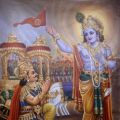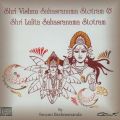Krishna Delivering Gita Sermon to Arjuna

Mahabharata, the great Sanskrit epic by sage Vyasa, discovers its theme not merely in Arjuna’s act, or in acts of other characters but as much in the state of Arjuna’s mind, his delusion or ignorance. In truer sense Mahabharata is the tale of whatever the man is born with, whatever inherent in him : delusion, ignorance, infatuations, love, attachment, detachment, anger, hatred, vengeance, intrigues, commitments, sacrifices, righteousness, loyalties, might, courage, wisdom, conspiracies, lust, evil, good, and other aspects of the man’s mind, the acts of body being merely their manifestations. A long poem running into many cantos and many streams from mythical to scientific exploration of man’s nature, Mahabharata pre-dates the Common Era by six-five centuries, though even today the truths that it explored are as true as ever and attribute to the poem its timeless and universal character.
Other products and services:
- +1 (347) 468-7193
- 2573 Hamline Avenue N Suite A Roseville, MN
- www.exoticindiaart.com




